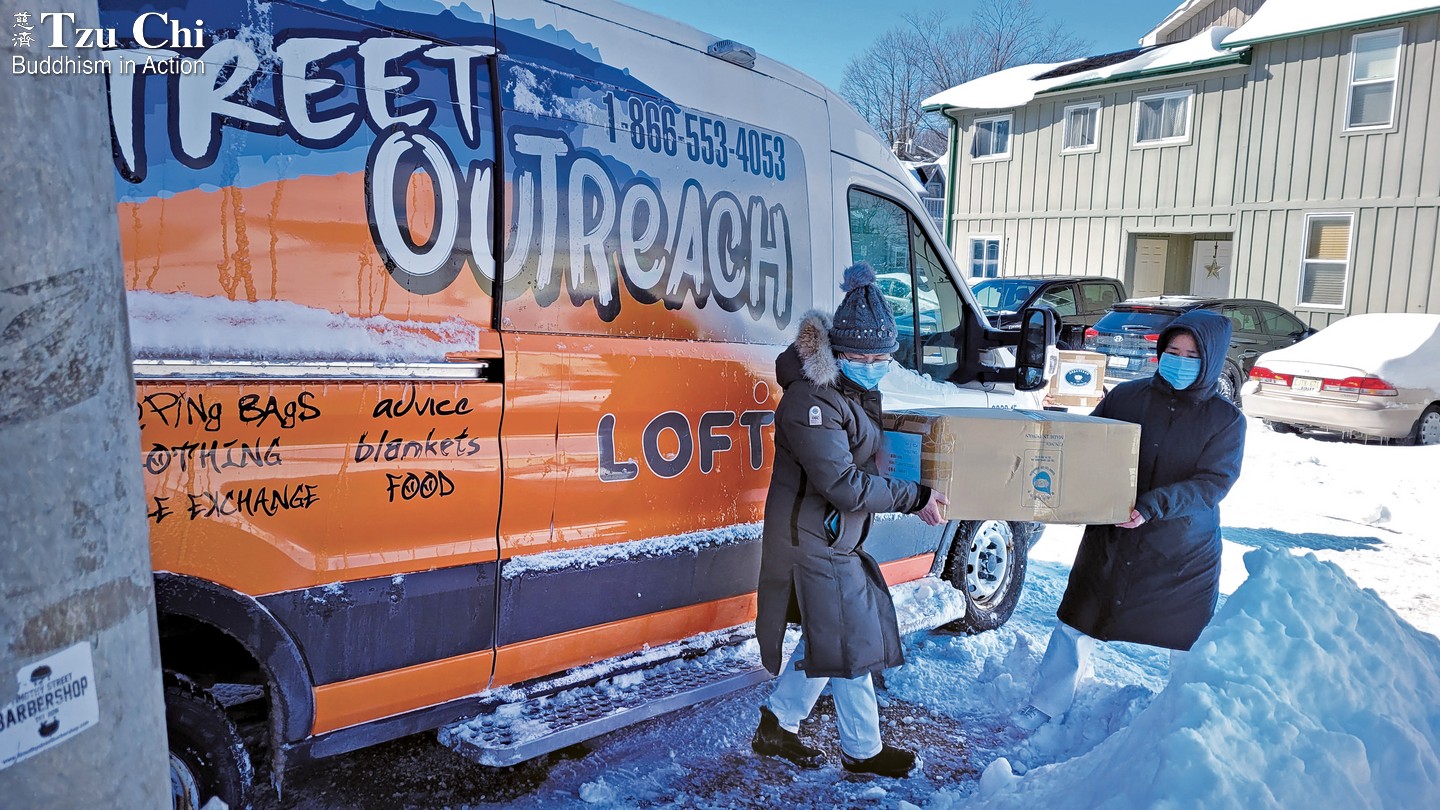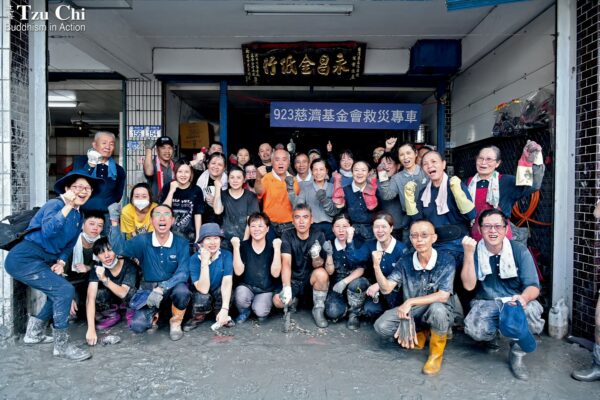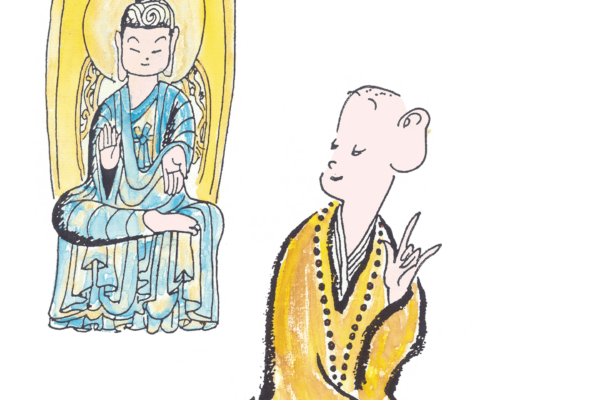By Julia Chang
Translated by Syharn Shen
I am a Canadian immigrant enjoying the abundance of living in this wealthy country. However, I can’t ignore the homeless hidden in the dark and marginalized corners of society.

Since 2015, Tzu Chi Canada’s North Toronto branch has been partnering with Inn From the Cold in Newmarket, providing vegetarian meals three times a year for the homeless.
Francis Leung
The season when maple trees turn bright red has arrived again. Canadian geese play in the water on the lake, seizing the final moments of warmth to bask in the golden sunlight. The birds will be reluctant to leave this beautiful land, but soon they will set off on their long journey, migrating south towards warmer lands.
It was this same time of year, back in 2015, when Tzu Chi volunteers in Toronto first served hot meals to homeless people in Newmarket, York Region. There were very few Asians among those we served, and we were initially worried whether they would like the Chinese food we had prepared. Thankfully, with our culinary volunteers’ careful planning and cooking skills, the community meal was a hit. We’ve been serving hot meals to the homeless at least three times a year ever since. The homeless look forward to our meal events, often asking us when the next one will take place.
In affluent Canada, apart from certain downtown areas, it’s rare to see homeless people on the streets. Over 80 percent of people who are homeless in Canada are hidden, living in the woods or in their cars. While some suffer from mental illness, others are plagued by drug addiction. Those who became homeless due to financial challenges are relatively few.
While there are various causes that lead to homelessness, the COVID pandemic worsened the situation, as it brought mental and financial stress to many people’s lives. It also changed the demographics of the homeless. Statistics show that in 2020, over 20 percent of homeless people in Canada lost their homes because unemployment made it impossible for them to keep up on their mortgages. Compared to previous years, the number of the homeless living chronically on the streets has risen to 80 percent. While the government tries to offer more housing options, it simply can’t keep up with the rising number of people in need; the waitlist is too long. Because the shelters in downtown York can no longer accommodate the increased number of the homeless, they’ve started moving north to the suburbs.
As Tzu Chi volunteers, we reach out to the homeless, regardless of why they are on the streets. In poor countries, it is not unusual for Tzu Chi to provide aid to over a thousand people during a single distribution; volunteers in those countries also come into direct contact with those in need. But in affluent Canada, where people value their privacy, it’s difficult to know who needs help. That’s why Tzu Chi Canada’s North Toronto branch chose to partner with local charities—Inn From the Cold and LOFT’s Crosslinks Street Outreach Van in Newmarket—to give help. These groups have been serving locally for decades and know where to find the homeless. Most people donate what they want to give, but the supplies may not be what the charities or the homeless really need, so Tzu Chi stepped up to fill in gaps of needed supplies.
We have been offering three to four community meals for the homeless each year, through our partnership with Inn From the Cold, and hold large-scale distributions of supplies during summer and winter. We also provide supplies to LOFT’s Street Outreach Van, which serves different areas every day. From the list of needed supplies our partners give us every month, we’ve learned that the needs of the homeless vary according to the season. They need blankets in winter, and mosquito repellant and umbrellas during summer. Deodorant is needed throughout the year.
Providing constant support
Tzu Chi’s North Toronto office was just two years old when we first started to reach out to the homeless. We had only a few people in the beginning, but now have a much larger team of community volunteers that can be mobilized anytime.
Many Canadians give their time to volunteering, and they donate regularly when their financial conditions allow. We live in a country rich in love, and Tzu Chi is but one of many charity organizations. Each year, we need to register early for our community meals in order to book the dates that we want. In a place with so many groups reaching out to those in need, what is it that makes Tzu Chi different? We serve with gratitude, respect, and love, as taught by Dharma Master Cheng Yen, the founder of Tzu Chi.
Because Canadian nights are chilly in the summer and bitter cold in the winter, Tzu Chi volunteers in North Toronto have been collecting milk bags and weaving them into floor mats since 2019 to give to the homeless every month. Soft to the touch and able to insulate the cold from the icy ground or floor, the mats are useful for those who live in tents. Together with Tzu Chi’s signature blankets, made from recycled PET bottles, the mats can help the homeless get by for three out of four seasons a year—it’s only during the winter that the homeless seek accommodation in shelters. Even though the government has been trying its best to provide options, there is still a lack of beds. In addition, isolation and social distancing measures due to the pandemic have greatly reduced the number of beds. When the homeless have no choice but to stay out on the streets in the biting cold, the mats and blankets can make a crucial difference.
Mary Ann Proulx, coordinator for LOFT’s Crosslinks Street Outreach Van program, is grateful for Tzu Chi’s support over the years. Martha Berry, coordinator at Inn From the Cold, also thanked Tzu Chi for preparing healthy and delicious vegetarian meals. In the early days of the pandemic in 2020, when charities temporarily suspended their services, only Tzu Chi kept operating as usual and continued to support the homeless. Due to social distancing measures, we couldn’t enter the central kitchen to cook and prepare the meals, so we ordered boxed meals from vegetarian restaurants and gave them out to the homeless. It was also during this time that we had the opportunity to share with our partner groups the story of Tzu Chi’s coin banks—how saving a little every day in a coin bank can help people in need.
According to I Count: York Region’s Homeless Count in 2021, there were 235,000 homeless people in Canada. The social problem of homelessness in modern countries has become a given. Having immigrated to Canada, a country generally regarded as a paradise for immigrants, I’ve been very lucky and privileged to enjoy the benefits and abundance of living here. But I cannot ignore the homeless living in the dark and marginalized corners of society. As a Tzu Chi volunteer, I’m grateful for the opportunity to reach out to these corners, see the needs of people who are less fortunate than me, and give what I can.

Working with LOFT’s Crosslinks Street Outreach Van, Tzu Chi volunteers in North Toronto regularly provide supplies for the homeless.
Vincent Chiou
Giving back to society
Master Cheng Yen often reminds Tzu Chi volunteers around the world to repay the society that nurtures them. Compared to the work Tzu Chi offices in other countries have been carrying out, the scale of our work in Canada is small. Yet, I’ve come to understand that different approaches of operation are needed to accommodate cultural and social differences across regions. I appreciate the efforts of Tzu Chi volunteers in North Toronto, and I hope we can further connect to the local culture and provide better care for the homeless.
Having immigrated to Canada over 25 years ago, I’ve long been writing ”Canadian” in the citizenship box when I fill out forms and documents. Like a drifting dandelion seed that has fallen to the ground, I’ve put my roots down in this country and raised my children here. My family leads a stable life in this land. Canada is my home now, and Taiwan has become the place where I came from. As I’ve built my life and my family here in Canada, it’s my responsibility to give back to this country.
As a Tzu Chi volunteer in Eastern Canada, what better way to look after my home than caring for my community, including the homeless in need?



